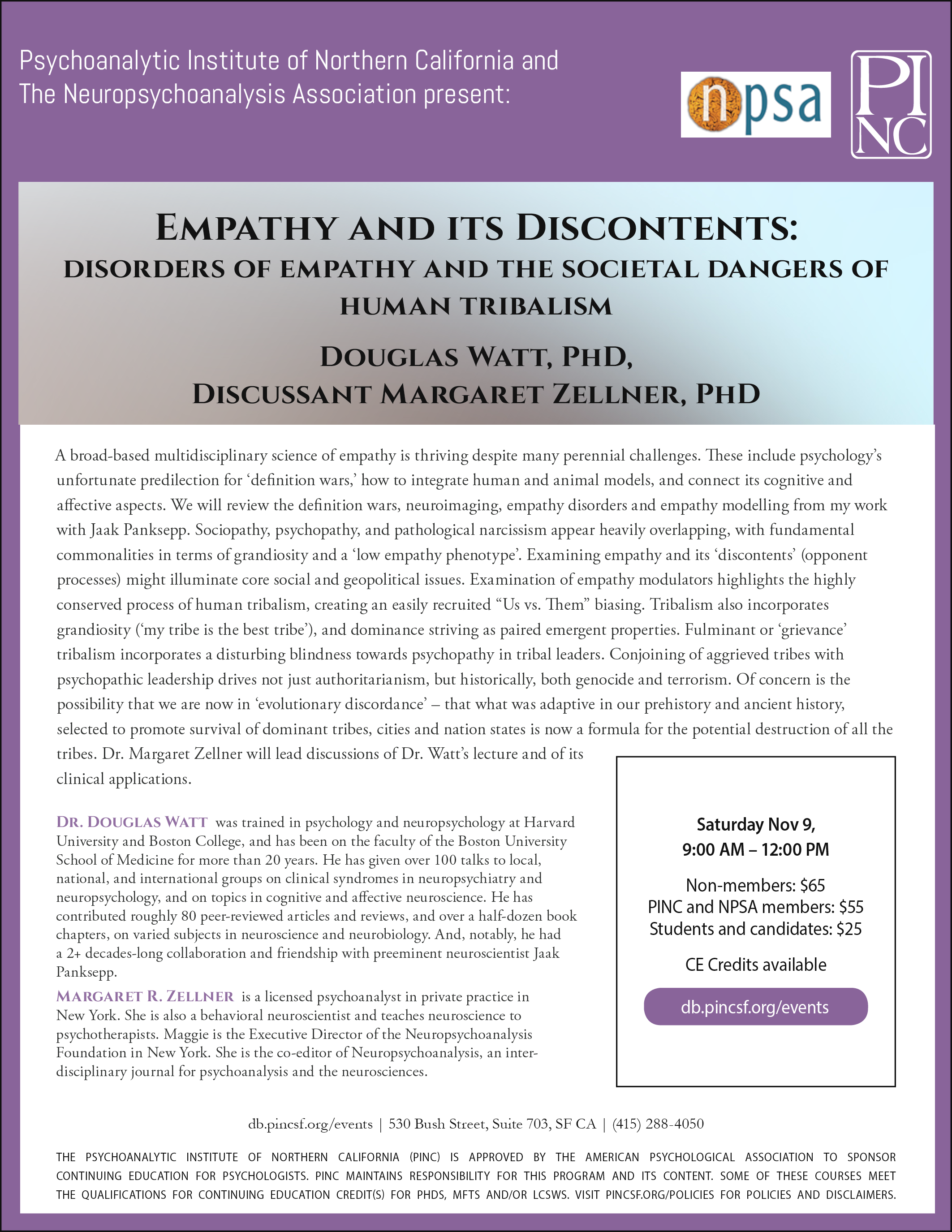Neuropsychoanalysis – Empathy and its Discontents
Empathy and its Discontents
Douglas Watt, Ph.D., Discussant Margaret Zellner, Ph.D.
Saturday Nov 9, 9:00 AM – 12:00 PM, Pacific
Dr. Watt will define empathy as a complex triangle of relationships between theory of mind/perspective taking, affective resonance/contagion, and prosocial motivation/caring. He will discuss disorders of empathy and the societal dangers of human tribalism, which precludes empathy. Clinical applications will also be presented.
 A broad-based multidisciplinary science of empathy is thriving despite many perennial challenges. These include psychology’s unfortunate predilection for ‘definition wars,’ how to integrate human and animal models, and connect its cognitive and affective aspects. We will review the definition wars, neuroimaging, empathy disorders and empathy modelling from my work with Jaak Panksepp. Sociopathy, psychopathy, and pathological narcissism appear heavily overlapping, with fundamental commonalities in terms of grandiosity and a ‘low empathy phenotype’. Examining empathy and its ‘discontents’ (opponent processes) might illuminate core social and geopolitical issues. Examination of empathy modulators highlights the highly conserved process of human tribalism, creating an easily recruited “Us vs. Them” biasing. Tribalism also incorporates grandiosity (‘my tribe is the best tribe’), and dominance striving as paired emergent properties. Fulminant or ‘grievance’ tribalism incorporates a disturbing blindness towards psychopathy in tribal leaders. Conjoining of aggrieved tribes with psychopathic leadership drives not just authoritarianism, but historically, both genocide and terrorism. Of concern is the possibility that we are now in ‘evolutionary discordance’ – that what was adaptive in our prehistory and ancient history, selected to promote survival of dominant tribes, cities and nation states is now a formula for the potential destruction of all the tribes. Dr. Margaret Zellner will lead discussions of Dr. Watt’s lecture and of its clinical applications.
A broad-based multidisciplinary science of empathy is thriving despite many perennial challenges. These include psychology’s unfortunate predilection for ‘definition wars,’ how to integrate human and animal models, and connect its cognitive and affective aspects. We will review the definition wars, neuroimaging, empathy disorders and empathy modelling from my work with Jaak Panksepp. Sociopathy, psychopathy, and pathological narcissism appear heavily overlapping, with fundamental commonalities in terms of grandiosity and a ‘low empathy phenotype’. Examining empathy and its ‘discontents’ (opponent processes) might illuminate core social and geopolitical issues. Examination of empathy modulators highlights the highly conserved process of human tribalism, creating an easily recruited “Us vs. Them” biasing. Tribalism also incorporates grandiosity (‘my tribe is the best tribe’), and dominance striving as paired emergent properties. Fulminant or ‘grievance’ tribalism incorporates a disturbing blindness towards psychopathy in tribal leaders. Conjoining of aggrieved tribes with psychopathic leadership drives not just authoritarianism, but historically, both genocide and terrorism. Of concern is the possibility that we are now in ‘evolutionary discordance’ – that what was adaptive in our prehistory and ancient history, selected to promote survival of dominant tribes, cities and nation states is now a formula for the potential destruction of all the tribes. Dr. Margaret Zellner will lead discussions of Dr. Watt’s lecture and of its clinical applications.
CE Credits offered: 3
Course Objectives
After completing this course participants will be able to:
- Define the triangle of empathy.
- What are the modulating variables of empathy?
- What evidence is there to suggest we are possibly in a state of 'evolutionary discordance?
db.pincsf.org/events – 415-288-4050 — 530 Bush St, Suite 703, SF CA USA — pincsf@gmail.com
The Psychoanalytic Institute of Northern California (PINC) is approved by the American Psychological Association to sponsor continuing education for psychologists. PINC maintains responsibility for this program and its content. Visit db.pincsf.org/policies for policies and disclaimers.
CA
United States
| Admission | |
| Non-Member | $65.00 |
| PINC/NPSA Member | $55.00 |
| Students Candidates and CMH workers | $25.00 |
| CE Credits | $30.00 |
